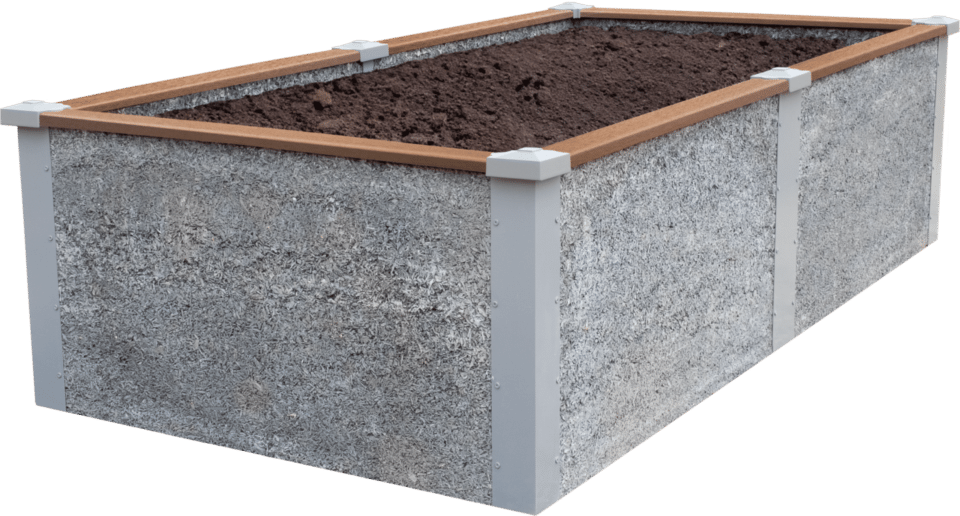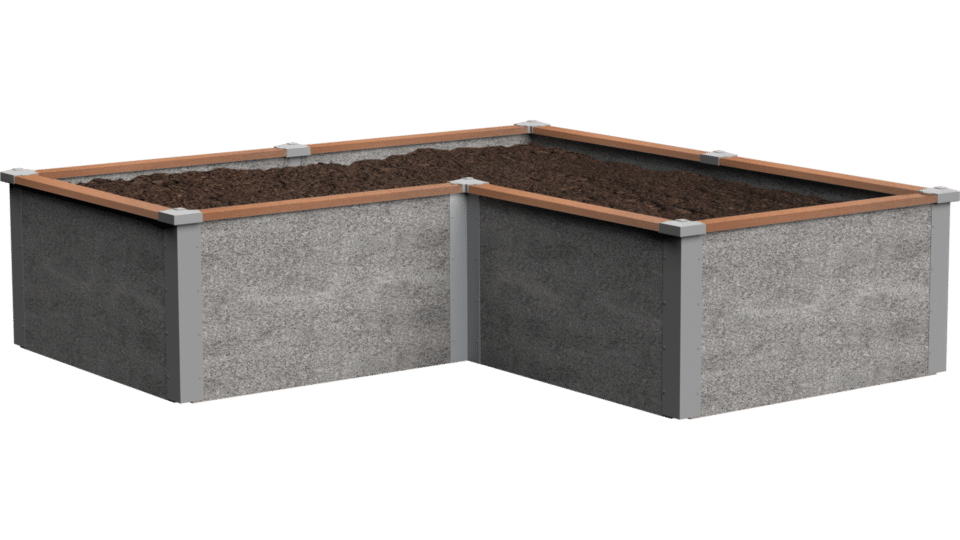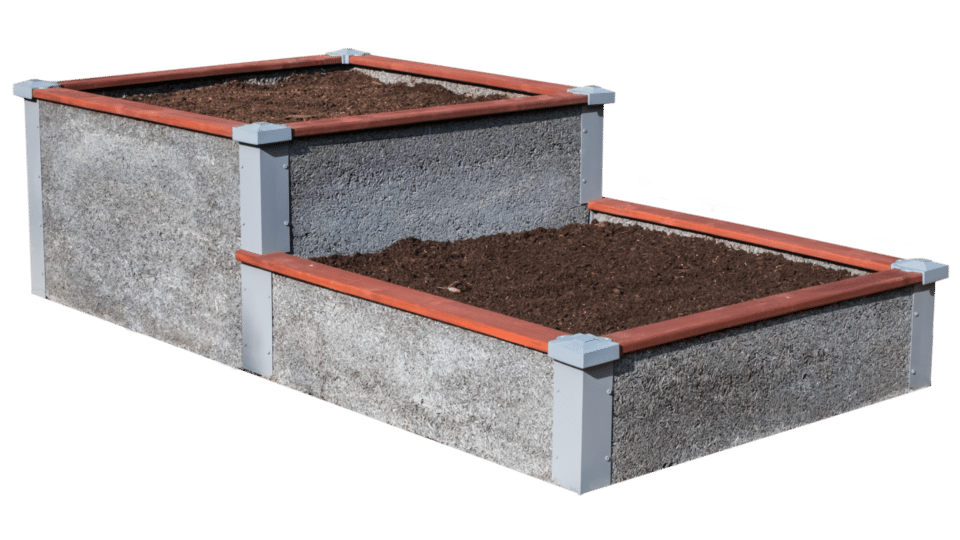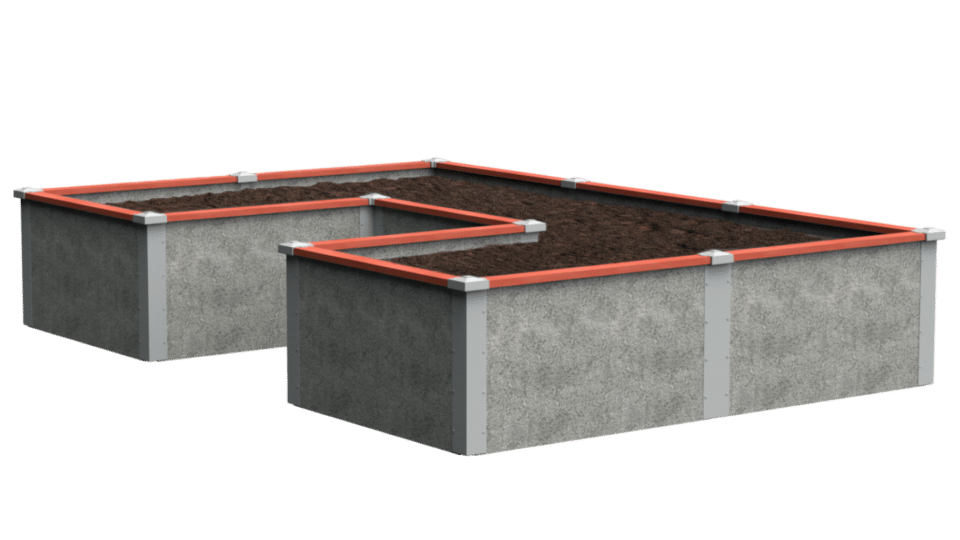How does Durable GreenBed Compare with Metal Beds?
It out performs metal beds on durability, level of maintenance required, beauty and more!
Durable GreenBed verses Metal Beds
You should choose Durable GreenBed over metal garden beds because of our unique blend of woodchip and concrete. It is breathable, beautiful and great for your plants. Durable GreenBed kits fit into a garden much better than a shiny metal garden bed with their matte, woodchip finish. While metal beds absorb and retain heat in the sun which harms plants, Durable GreenBed’s unique finish allows airflow and reflects heat, keeping your plants temperature well regulated.
Durability
Metal garden beds are prone to denting and bending which is difficult to fix.
Heat Sensitivity
Metal garden beds have no natural insulation. In the summer, this can burn the leaves of your plants and dry out your soil. In the winter, metal garden beds are the first to freeze.
Maintenance
To keep a metal garden bed from peeling and rusting, they spot sanded and repainted whenever rust spots occur.
Cost-effectiveness
Metal garden beds are competitively priced but require frequent maintenance to get the longest lifespan.
Three Reasons Why This Gardener Regrets Buying Metal Raised Garden Beds
With a permaculture design certificate and a master’s degree in sustainability, this gardener has given much thought to gardening best practices. In this video, she gives her top three reasons for regretting buying metal raised garden beds in the hopes of helping you decide if buying a raised metal garden bed is the best choice for you.
Learn More About Metal Garden Beds
Durability
Durable GreenBed's products last over 20 years, and are non-toxic and made from natural materials.
Superior Construction
Durable GreenBed's kits are strong because of their cement and woodchip formula which keeps our beds from bending or denting like a raised metal garden bed would.
Durable GreenBed Garden Beds
COST-EFFECTIVENESS
Our competitive price point combined with the lifespan of the bed makes Durable GreenBed a great value for your garden.
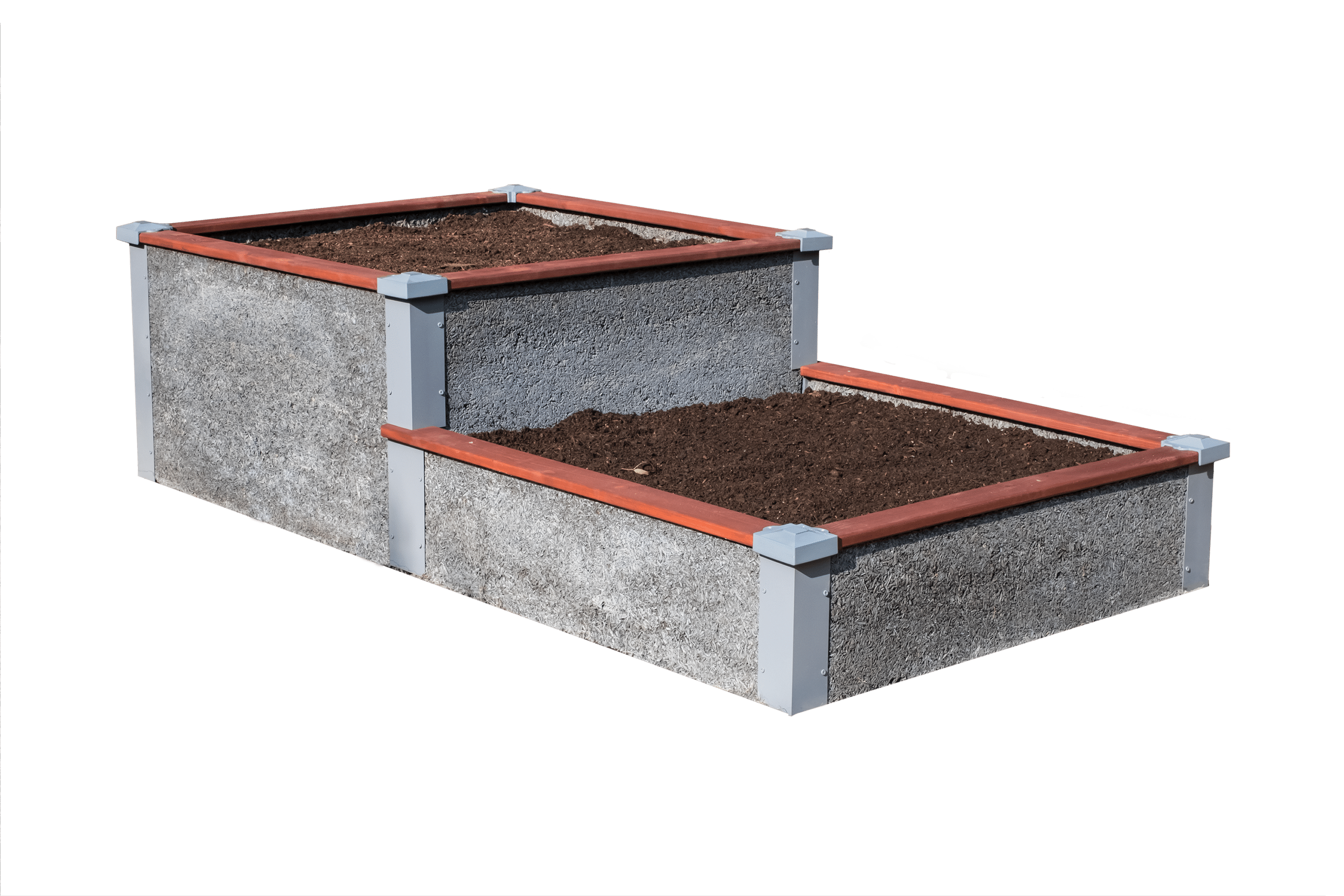
Customization Options
Our beds can be produced in any dimension or shape based on your particular garden space and aesthetic.
Maintenance
Durable GreenBed kits' unique materials make them age beautifully with no rust or peeling finishes and little to no maintenance required.
Environmental Sustainability
Durable Greenbed is committed to sustainability which is why we use recycled materials to reduce waste and minimize our environmental impact.
Shop Durable GreenBed Raised Garden Bed kits
-
Rectangular Raised Garden Bed Kit
$471.00 – $2,085.00Price range: $471.00 through $2,085.00 -
L-Shaped Raised Garden Bed Kit
$786.00 – $1,305.00Price range: $786.00 through $1,305.00 -
4’x8’ Stepped Raised Garden Bed Kit
$865.00 – $1,073.00Price range: $865.00 through $1,073.00 -
U-Shaped Raised Garden Bed Kit
$1,199.00 – $2,446.00Price range: $1,199.00 through $2,446.00
Frequently Asked Questions
Most frequent questions and answers
What are the disadvantages of metal raised garden beds?
Metal garden beds come with several disadvantages. They are less breathable than organic materials like wood, which can block air flow to the soil and make it easier to overwater plants, leading to root rot due to standing water at the bottom. Additionally, metal beds can be pricey depending on the style and materials used. Over time, they can rust, especially when exposed to acidic soil. Beds made from galvanized steel may also leach zinc into the soil, which, while safe in small amounts, can become toxic in higher concentrations. Certain metals also retain heat, making the soil too warm for sensitive plants, and some metal beds have sharp corners, posing a safety risk to children or anyone nearby.
What is the most durable raised garden bed?
The most durable raised garden bed option is Durable GreenBed’s patented wood-crete composite material. This material combines the strength and longevity of concrete with the natural benefits of wood, offering resistance to rot, pests, and weathering without the heavy weight of stone or brick. Unlike traditional wood, it won’t warp or degrade over time, making it a long-lasting solution for raised beds. Additionally, it’s easier to install than concrete or stone and more affordable than metal options like galvanized or Corten steel. Durable GreenBed’s wood-crete composite is an ideal choice for gardeners looking for a highly durable, low-maintenance, and sustainable raised garden bed option.
what type of material is best for raised garden beds?
The best material for raised garden beds is Durable GreenBed’s wood-crete composite. It combines the strength and longevity of concrete with wood’s natural benefits, offering exceptional durability and resistance to rot, pests, and weathering. Unlike traditional wood, which can warp or degrade over time, wood-crete composite requires minimal maintenance. While materials like stone, brick, and concrete are highly durable but heavy and expensive, and metal options like galvanized or Corten steel can rust or retain too much heat, Durable GreenBed strikes the perfect balance, providing a long-lasting, low-maintenance, and eco-friendly solution for raised garden beds.
Do metal raised garden beds get too hot?
Yes, metal-raised garden beds can get too hot, especially in warmer climates or during the summer months. Metal, particularly galvanized steel and Corten steel, retains heat, which can cause the soil inside the bed to warm up more than in traditional garden beds made from wood or other materials. This excessive heat can be detrimental to plants, particularly those that are more sensitive to temperature fluctuations, potentially stunting growth or causing root damage. To mitigate this, it’s important to position metal beds in areas with some afternoon shade or to use materials that provide insulation, such as mulch, to help regulate the soil temperature.
What is the safest material for raised garden beds?
The safest material for raised garden beds is untreated wood (such as cedar or redwood), or wood-crete composite materials like Durable GreenBed. Untreated wood is a natural option that doesn’t contain harmful chemicals, making it safe for both plants and people. Wood-crete composite, which combines concrete and wood, also offers a non-toxic, durable solution that is resistant to pests and weathering without the risk of chemical leaching. Materials like pressure-treated wood or some metal beds (especially those treated with chemicals like zinc or galvanized coatings) may leach potentially harmful substances into the soil, which can affect plant growth and be harmful to humans if consumed in high quantities.

